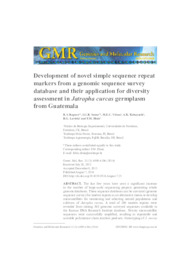Development of novel simple sequence repeat markers from a genomic sequence survey database and their application for diversity assessment in Jatropha curcas germplasm from Guatemala.
Development of novel simple sequence repeat markers from a genomic sequence survey database and their application for diversity assessment in Jatropha curcas germplasm from Guatemala.
Author(s): RAPOSO, R. S.; SOUZA, I. G. B.; VELOSO, M. E. da C.; KOBAYASHI, A. K.; LAVIOLA, B. G.; DINIZ, F. M.
Summary: The last few years have seen a significant increase in the number of large-scale sequencing projects generating whole genome databases. These sequence databases can be surveyed (genome sequence survey) for tandem repeats as an alternative means to develop microsatellites for monitoring and selecting natural populations and cultivars of Jatropha curcas. A total of 100 tandem repeats were revealed from mining 368 genomic surveyed sequences available in the Kazusa DNA Research Institute database. Twenty microsatellite sequences were successfully amplified, resulting in repeatable and scorable polymerase chain reaction products. Genotyping of J. curcas accessions from the Guatemalan population revealed 18 polymorphic loci. The average number of alleles per locus was 6.9, and allelic sizes ranged from 94 to 299 bp. Expected and observed heterozygosities ranged from 0.118 to 0.906 and from 0.082 to 0.794, respectively. Polymorphic information content values ranged from 0.114 (JcSSR-34) to 0.886 (JcSSR-33) with an average of 0.627. Analysis with Micro-Checker indicated few null alleles for locus JcSSR-37 in Guatemalan populations, which may be a possible cause of its deviation from Hardy-Weinberg equilibrium, even after Bonferroni?s correction. No loci showed significant linkage disequilibrium. These microsatellite loci are expected to be valuable molecular markers in J. curcas because they show high levels of polymorphism and heterozygosity.
Publication year: 2014
Types of publication: Journal article
Unit: Embrapa Mid-North
Observation
Some of Embrapa's publications are published as ePub files. To read them, use or download one of the following free software options to your computer or mobile device. Android: Google Play Books; IOS: iBooks; Windows and Linux: Calibre.
Access other publications
Access the Agricultural Research Database (BDPA) to consult Embrapa's full library collection and records.
Visit Embrapa Bookstore to purchase books and other publications sold by Embrapa.

